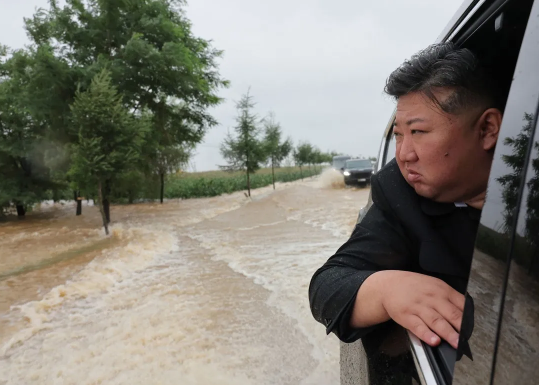North Korea's Emergency Response: Helicopters Mobilized in Flood Rescue Operation
In a rare display of state-led crisis management, North Korea has launched a large-scale military operation to rescue thousands of citizens stranded in flood-ravaged areas. The Korean Central News Agency (KCNA) reported on Monday that the country's highest echelons of power, including Kim Jong Un himself, are directly involved in the rescue efforts.
According to KCNA, Kim Jong Un "personally guided" the military rescue operation, which involves a fleet of 10 helicopters and naval lifeboats. In a gesture that underscores the gravity of the situation, Kim was reported to have shaken hands with the pilots "one by one," emphasizing the importance of their mission.
However, the rescue operation also revealed underlying issues in North Korea's disaster preparedness. Kim reportedly reprimanded officials for their inadequate preparation and response to the recent torrential rains, despite previous directives to enhance the country's resilience against natural disasters. This criticism comes in the wake of a crisis response meeting held last week to discuss strategies for mitigating the impact of natural calamities on the nation's agriculture.

The urgency of the situation is highlighted by the unprecedented levels of rainfall North Korea has been experiencing. Kaesong City, for instance, recorded a staggering 463 mm (18.2 inches) of rain in a single day in July. South Korea's meteorological administration confirmed this as the highest volume of rainfall recorded in the North in nearly three decades.
The impact of such extreme weather events is particularly severe in North Korea due to its isolated status and economic challenges. The country's weak infrastructure, coupled with extensive deforestation, has left it particularly vulnerable to flooding. In response, North Korea has been working to implement flood prevention measures, although some of these efforts have raised concerns in neighboring South Korea.
One such instance occurred in early July when South Korea's Ministry of Environment reported that North Korea had likely discharged water from the Hwanggang Dam near the inter-Korean border without prior notification. This action, departing from recent practices, has added to the tensions between the two nations.
Indeed, the relationship between North and South Korea is currently at a low point. In 2020, Pyongyang unilaterally severed all official military and political communication links with Seoul and dramatically destroyed a disused inter-Korean liaison office on its side of the border.
This flood crisis and the subsequent rescue operation offer a rare glimpse into North Korea's domestic crisis management capabilities. While the mobilization of military assets for civilian rescue demonstrates the regime's ability to respond to natural disasters, the reported criticism from Kim Jong Un suggests there is room for improvement in the country's disaster preparedness and response mechanisms.
As North Korea continues to grapple with the aftermath of these floods, the international community watches closely. The crisis not only highlights the humanitarian challenges faced by the North Korean people but also underscores the potential for environmental issues to impact regional stability in an already tense geopolitical landscape.
Lire aussi
Latest News
- 17:25 Iran's President Offers Olive Branch: Direct Talks with US on the Table
- 17:00 Unveiling the Mystery: Elon Musk's Stealth Project with Tesla
- 16:44 UK PM Starmer Seeks Immigration Strategies from Italy’s Meloni
- 16:20 Morocco: A Rising Star in Global Cybersecurity, Leading the Way in Digital Resilience
- 15:50 Unrelenting Storms Forecast: Morocco Braces for a Week of Turbulence
- 15:33 A Son's Plea: Unraveling the Motives Behind the Florida Golf Course Incident
- 15:20 Morocco's Security Measures: A Strategic Response to Migration Challenges



